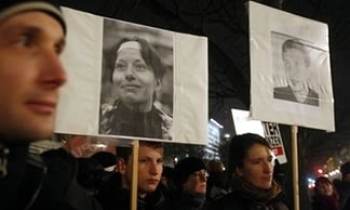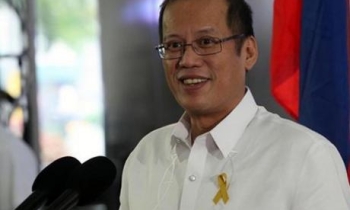MOSCOW // When Russia's president hailed his country's record on press freedom this week, he omitted the newest, significant exception to the rights of the press: Journalistic freedom here apparently no longer extends to calling President Vladimir V. Putin unflattering names.
The evidence includes prosecutors last month charging the editor of an online newspaper with the criminal offense of "insulting a representative of the state" after referring to Putin as "the nation's phallic symbol."
Vladimir Rakhmankov, who could be sentenced to up to a year of hard labor if convicted, made the remark in a satirical article about Putin's recent public appeal to Russian women to have more children as a way to halt the country's population decline.
Rakhmankov, whose site, cursiv.ru, has since been shut down by his Internet provider, previously irked authorities by accusing the governor of the Ivanovskaya region, northeast of Moscow, of taking bribes.
"I'm absolutely sure it's retribution," Rakhmankov said of the charge the prosecutor there filed against him.
The case is one of many highlighting the fragile state of press freedoms, as the Kremlin increases its influence over what people can write and broadcast. It also raises the possibility that the Internet, one of the last outlets of unfettered expression here, will become state authorities' next target.
The vast majority of Russians get their news from television, and the three national networks are either directly or indirectly controlled by the state. Kremlin officials provide "guidelines" on how - and whether - to cover certain topics.
The lone remaining independent channel, REN-TV, changed hands last year, after which critics said its coverage became more sympathetic to the Kremlin. The new owners dismissed a news program anchor, Olga Romanova, after refusing to air two of her stories, including one about prosecutors dropping criminal charges against Russian Defense Minister Sergei Ivanov's son, whose car struck and killed a pedestrian in 2005.
Officials, Romanova said in an interview, "are there to punish all the free thinkers and all the critics, and if they do not do that, they know they will face retribution."
One of the last independent newspapers, Izvestiya, was acquired last summer by the state-controlled natural gas monopoly, Gazprom. The Russian press reported this week that another independent daily, Kommersant, is about to be sold to Roman Abramovich, the governor of the Far East region of Chukotka and a Putin ally.
Yesterday, former Soviet President Mikhail S. Gorbachev said that he and a legislator had bought 49 percent of the shares in Novaya Gazeta, an outspoken newspaper that has reported on government corruption. Novaya Gazeta's editor in chief, Dmitry Muratov, expressed confidence that Gorbachev's involvement would allow the paper to maintain editorial independence.
Putin remains keenly sensitive about his image in the press.
During his first four-year term, the Kremlin was particularly aggravated by a program broadcast on the NTV station, called Kukli, featuring a puppet in Putin's likeness and a heavy dose of satire. NTV was successfully pressured to remove the puppet from the show, before the station's purchase by Gazprom.
"He cannot take any kind of alternative point of view," Romanova said of the president. "He cannot take any criticism."
Oleg Poptsov, as general director of TV Center, a station controlled by Moscow's municipal government, aired a program last year in which he conducted an imaginary dialogue with Putin, whose face was broadcast on a screen. Addressing the president as "Your High Loneliness," Poptsov criticized him for being isolated and out of touch with Russians. In December, Poptsov's contract was allowed to expire.
In the article he posted on cursiv.ru, Rakhmankov called Putin's proposal for increasing the birth rate "ravings" and suggested that Putin make himself the nation's official phallic symbol, so that merchants might sell matryoshka dolls - the traditional wooden nesting dolls - depicting the president's head as the head of a phallus.
Rakhmankov also invoked a recent news item touted by Ivanovo's mayor saying that a rare type of horse at the local zoo had produced offspring and that other baby animals were on the way. Rakhmankov suggested they must have been heeding Putin's call to procreate.
Aleksandr Kopytov, senior assistant to the prosecutor, declined to comment on which part of Rakhmankov's article was considered insulting.
Russian criminal law prohibits insulting public officials. Though Kopytov conceded that defining what constitutes an insult is subjective, he said the case against Rakhmankov had nothing to do with quashing free speech.
"This is not a question of limiting the mass media," he said. "This is a specific journalist who did a specific deed. From the view of the prosecutor's office, a crime was a committed. The court will prove him guilty or not."
A trial date has not been set.
In remarks Monday at the World Association of Newspapers meeting, Putin said the press played an "irreplaceable role in forming the new Russia," and he called freedom of press here "our valued achievement."
The president said that state control of the media was actually decreasing, which in a technical sense is correct: Many influential television stations and newspapers are not controlled directly by the Kremlin but by companies with close ties to it.
In an essay in yesterday's Moscow Times, Vladimir Ryzhkov, an independent member of the Duma, the lower house of parliament, said that holding the annual press congress in Russia was like "holding a pork producers' convention in a Muslim country."
"Ninety percent of information Russians receive is controlled by the state," he told journalists at the forum yesterday. "The TV is under the full control of the ruling groups. There is a list of politicians not allowed to be on TV - including myself.
"If we have no free speech we can never develop a modern economy."
As for Rakhmankov, he said he would write every single word again. "I don't see myself as a hero," he said. "We cannot retreat. I'm going to keep doing what I'm doing."









